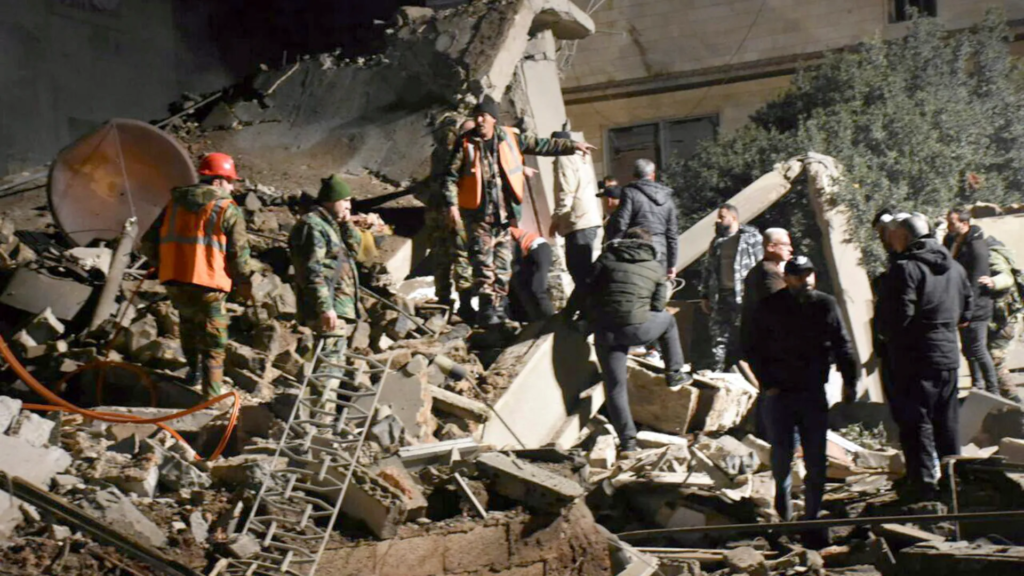In a significant escalation of regional tensions, Israeli strikes on Syria’s capital Damascus have resulted in the deaths of three civilians and left nine others wounded, according to state-run media reports. The strikes, described by Syrian authorities as “treacherous Israeli aggression,” have fueled concerns that the conflict could further escalate across the region.
The Syrian Arab News Agency (SANA) confirmed the casualties following the Israeli airstrikes, which targeted residential areas in the capital. One of the fatalities identified was Safaa Ahmad, a television anchor who was reportedly killed during the attack.
It is still unclear whether she is among the three civilians listed as casualties by state media. Footage shared on social media showed a vehicle engulfed in flames on a street, surrounded by apartment buildings, reflecting the destructive aftermath of the strikes.
Read : Syria: A Land of Ancient Heritage and Unyielding Spirit
While Israel’s Ministry of Defense has yet to comment on the incident, the airstrikes mark the latest in a series of military actions in the region as Israeli forces intensify their offensive.
Israeli Strikes and the Regional Conflict
The Israeli strikes on Syria’s Damascus coincide with the military’s ongoing operations in Lebanon. Israel has launched “limited, localized, and targeted” ground raids in Lebanon, which have been aimed at weakening Hezbollah, the armed group that has long opposed Israeli operations.
Read : Syria : One Of the Most Violent Countries In the World
Lebanese authorities reported that at least 95 people were killed, and 172 others were injured in Israeli strikes on Syria on Monday, marking a significant escalation in hostilities.

In response to the strikes, Hezbollah’s deputy leader, Naim Qassem, issued a stern warning, stating that the group is “prepared and ready” for a full-scale ground invasion.
His remarks come following the death of Hezbollah leader Hassan Nasrallah, and Qassem expressed confidence in a victory, referencing the group’s previous confrontation with Israel in 2006.
Fears of Regional Escalation
The conflict between Israel and armed groups like Hezbollah in Lebanon, coupled with airstrikes in Syria, has raised fears that the violence could escalate into a broader regional war. Fighting has already spilled over from Gaza into neighboring countries, sparking international concerns over the stability of the Middle East.
On Monday, U.S. President Joe Biden called for an immediate ceasefire in Lebanon in an effort to prevent further casualties and regional instability.

Despite this, Israeli Prime Minister Benjamin Netanyahu has firmly rejected any proposals for a ceasefire with Hezbollah. Netanyahu’s refusal to halt the fighting follows a joint call from the U.S., European Union, Australia, and several other nations for a 21-day pause in hostilities.
Netanyahu’s Stance on the Conflict
During a press conference last week, Netanyahu addressed the escalating violence and reiterated Israel’s determination to continue its military operations.
He emphasized the country’s commitment to achieving its objectives, particularly the safety and security of residents in Israel’s northern regions, which have been affected by Hezbollah’s attacks. Netanyahu vowed to continue striking Hezbollah “with full force” until these goals are accomplished.
As Netanyahu attended the United Nations General Assembly in New York, the ongoing strikes in Syria and Lebanon have underscored the complexities of the conflict. While international efforts to broker a ceasefire are underway, the situation on the ground remains volatile.
Humanitarian Concerns Amid the Conflict
The recent airstrikes and ground raids have exacerbated the humanitarian crisis in Lebanon and Syria, with civilian casualties mounting as the conflict intensifies.

Both countries have seen significant destruction of infrastructure, displacement of residents, and a growing number of deaths and injuries.
In Syria, the latest strikes in Damascus have renewed concerns about the safety of civilians in areas already ravaged by years of war.
The escalating violence across the region has drawn international criticism, with calls for both sides to exercise restraint and prioritize civilian lives. As the conflict deepens, the prospect of a broader regional war looms large, threatening the fragile peace in the Middle East.

